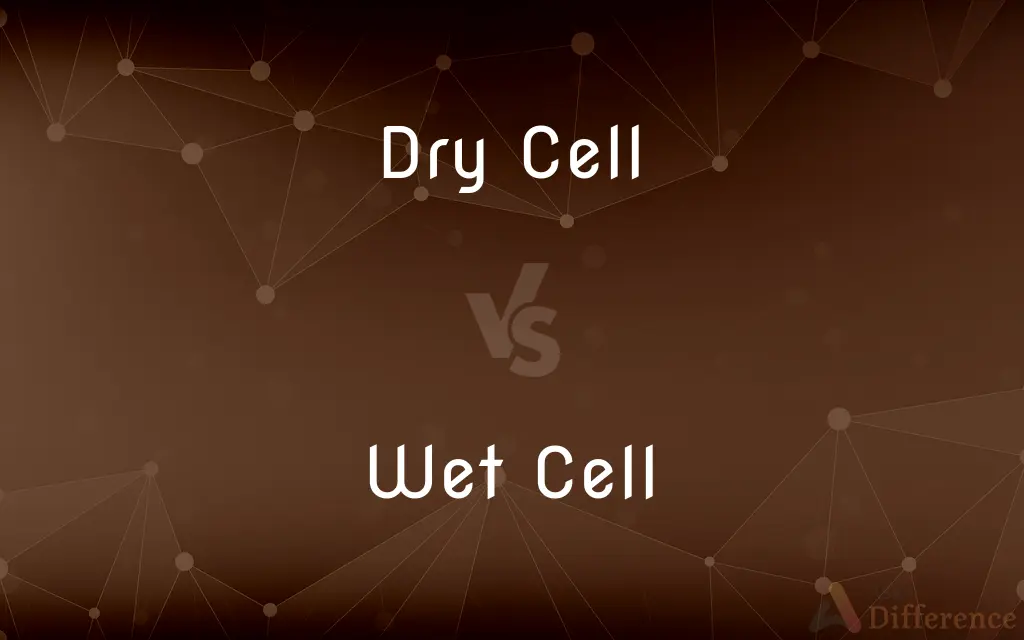Dry Cell vs. Wet Cell — What's the Difference?
By Tayyaba Rehman — Published on January 1, 2024
Dry cells use a paste electrolyte, are portable, and have a lower risk of leakage. Wet cells use a liquid electrolyte, are often stationary, and have a higher energy density.

Difference Between Dry Cell and Wet Cell
Table of Contents
ADVERTISEMENT
Key Differences
Dry cells have an electrolyte in a paste form, reducing the risk of leakage. Wet cells contain a liquid electrolyte, which can be prone to spillage if not properly maintained.
In dry cells, the paste electrolyte minimizes internal resistance. Wet cells often require maintenance due to the nature of their liquid electrolyte, which may evaporate or need topping up.
Dry cells are typically used in portable devices due to their compact and leak-proof nature. Wet cells, being larger and potentially hazardous due to their liquid content, are often used in stationary applications like vehicle batteries.
The energy density of dry cells is generally lower compared to wet cells. Wet cells, with their liquid electrolyte, usually provide higher energy density and are suitable for high-power applications.
Dry cells are considered safer for everyday consumer use in gadgets and small devices. Wet cells, given their high energy capacity and maintenance requirements, are more common in industrial or automotive settings.
ADVERTISEMENT
Comparison Chart
Electrolyte Type
Paste form electrolyte.
Liquid electrolyte.
Portability
Portable and compact.
Often large and stationary.
Maintenance
Low maintenance, no refilling needed.
Requires regular maintenance and refilling.
Risk of Leakage
Minimal risk of leakage.
Higher risk of leakage and spills.
Energy Density
Generally lower energy density.
Higher energy density.
Compare with Definitions
Dry Cell
Paste Electrolyte Battery
Uses a paste electrolyte. A dry cell is often used in remote controls.
Wet Cell
Stationary Battery
Often used in stationary settings. The emergency lights use wet cells.
Dry Cell
Leak-proof Battery
Has a minimal risk of leakage. Dry cells are preferred for handheld gadgets.
Wet Cell
High Maintenance Battery
Requires regular check-ups. My boat's wet cell needs topping up.
Dry Cell
Portable Battery
Suitable for portable applications. My flashlight runs on dry cells.
Wet Cell
Higher Energy Density
Provides higher energy capacity. Wet cells are ideal for heavy-duty applications.
Dry Cell
Lower Energy Density
Offers relatively lower energy. Dry cells are sufficient for low-power devices.
Wet Cell
Industrial Battery
Common in industrial use. The factory's backup system uses wet cells.
Dry Cell
Consumer-friendly Battery
Safe for consumer use. Most toys are powered by dry cells.
Wet Cell
Liquid Electrolyte Battery
Contains a liquid electrolyte. Car batteries are typically wet cells.
Common Curiosities
Are Wet Cells suitable for portable devices?
Generally no, due to their size and risk of spillage.
What is a Wet Cell?
A battery with a liquid electrolyte, commonly used in stationary applications.
Can Dry Cells leak?
They have a minimal risk of leakage due to their paste electrolyte.
What applications are Wet Cells used for?
Often in vehicles and industrial power systems.
What is a Dry Cell?
A battery with a paste form electrolyte, often used in portable devices.
Do Dry Cells need maintenance?
They require minimal to no maintenance.
Where are Dry Cells commonly used?
In consumer electronics like flashlights and toys.
Can Dry Cells power a car?
Typically no, they're not designed for such high-power applications.
Can Wet Cells freeze in cold temperatures?
Yes, their liquid electrolyte can freeze, affecting performance.
What happens if a Dry Cell is damaged?
The risk is relatively low, but it might stop working or at worst, leak its paste.
How often do Wet Cells need maintenance?
Regularly, to check and refill the liquid electrolyte.
Is the energy density of Dry Cells high?
No, it's generally lower than that of wet cells.
Why do Wet Cells have higher energy density?
Due to their liquid electrolyte which allows more efficient chemical reactions.
Are Wet Cells considered safe for everyday use?
They can be hazardous if not properly maintained, hence not typically used in everyday consumer products.
Are Dry Cells environmentally friendly?
While better than wet cells in terms of leakage, disposal still requires care due to chemicals.
Share Your Discovery

Previous Comparison
Saturated Fatty Acids vs. Unsaturated Fatty Acids
Next Comparison
Direct Object vs. Indirect ObjectAuthor Spotlight
Written by
Tayyaba RehmanTayyaba Rehman is a distinguished writer, currently serving as a primary contributor to askdifference.com. As a researcher in semantics and etymology, Tayyaba's passion for the complexity of languages and their distinctions has found a perfect home on the platform. Tayyaba delves into the intricacies of language, distinguishing between commonly confused words and phrases, thereby providing clarity for readers worldwide.
















































